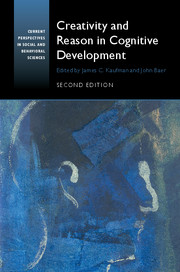Book contents
- Frontmatter
- Dedication
- Contents
- List of Contributors
- Acknowledgments
- 1 Creativity, Reason and Cognitive Development: Ten Years Later
- SECTION ONE CREATIVITY AND REASON IN CHILDHOOD AND THE SCHOOLS
- SECTION TWO CREATIVITY AND REASON IN COGNITION AND NEUROSCIENCE
- SECTION THREE CREATIVITY AND REASON: INTERACTIONS AND RELATED CONSTRUCTS
- Author Index
- Subject Index
1 - Creativity, Reason and Cognitive Development: Ten Years Later
Published online by Cambridge University Press: 05 February 2016
- Frontmatter
- Dedication
- Contents
- List of Contributors
- Acknowledgments
- 1 Creativity, Reason and Cognitive Development: Ten Years Later
- SECTION ONE CREATIVITY AND REASON IN CHILDHOOD AND THE SCHOOLS
- SECTION TWO CREATIVITY AND REASON IN COGNITION AND NEUROSCIENCE
- SECTION THREE CREATIVITY AND REASON: INTERACTIONS AND RELATED CONSTRUCTS
- Author Index
- Subject Index
Summary
“Does the development of knowledge and analytic thinking take a toll on creativity? Or can reason and rhyme coexist and be mutually beneficial?”
Ten years ago we published a book – Creativity and Reason in Cognitive Development – that tried to answer these two important questions. We introduced that volume with two quotes, one from Pablo Picasso, perhaps the twentieth century's most influential artist, and the other from one of Taoism's most influential thinkers, Chuang Tzu (also known as Zhuangzi):
Every child is an artist. The problem is how to remain an artist once he grows up.
In leaving childhood we forget our way home.
Much has happened in the ten years since the publication of that book. The quotes still work and the questions remain good ones. Today, we not only have better answers but also better questions.
Is there something about the development of one kind of thinking (such as the systematic, logical thinking whose growth and development Piaget and others have charted) that undermines imaginative and creative thinking (or that at least temporarily inhibits the expression of creative ideas)? Or is it perhaps the process of schooling itself, with its focus on the acquisition of knowledge and the production of correct (rather than imaginative) answers, which promotes this decline? To what extent do creativity and imagination decline in childhood, when students advance in their knowledge and learn reasoning skills? What factors might influence a decline? Theories of cognitive development typically show only unidirectional progress (although theorists may disagree whether such progress occurs steadily in small continuous improvements or comes in stages separated by plateaus during which developmental gains are consolidated). Declines in levels of skill, or even U-shaped developmental curves, are quite uncommon, yet many have observed just such an unusual pattern with regard to the development of creativity and of the imagination. If the development of one kind of thinking skill does impede another, are such interruptions temporary or do they persist and influence creativity at even the highest (Big-C) levels?
The idea that knowledge, reason, and creativity may sometimes be at odds with one another is the fountainhead from which flow many conundrums about creativity and cognitive development.
- Type
- Chapter
- Information
- Creativity and Reason in Cognitive Development , pp. 1 - 6Publisher: Cambridge University PressPrint publication year: 2016



